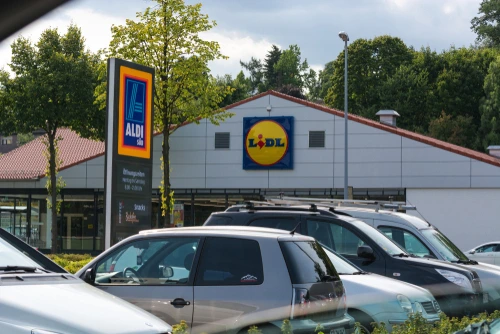
The cost-of-living crisis is driving massive growth for budget supermarkets while more expensive chains struggle to hold onto their customers.

New retail figures published by data analytics firm Kantar show that in the 12 weeks up to 22 January 2023, Aldi and Lidl made a combined sales total of £5.5b, up by a quarter compared with the same period last year.
Kantar’s data is based on the take-home grocery purchasing habits of 30,000 demographically representative households across Britain. Across all supermarkets, sales increased by 7.6% annually, driven by the inflation of food prices. The nation’s leading supermarkets – Tesco, Sainsbury’s and Asda – all saw sales rise fairly in line with the overall trend.
Aldi has grown to become the fourth-biggest supermarket
Meanwhile, Waitrose is struggling to hold on to customers for its higher-priced offerings. Despite inflation, Waitrose’s three-month takings actually fell by 0.6% compared with the same period last year and by 2.3% compared with two years ago.
Morrisons also saw a decline year on year of -1.9%, but even more striking was the 10.2% decline compared with the year before. In fact, 2022 saw Morrisons lose its position as the nation’s fourth-largest supermarket, overtaken by Aldi, which now accounts for 9.2% of the market share, a 1.4 percentage point increase compared with January 2022.
Lidl remains in sixth place but saw the next largest market share increase of 0.9 percentage points. Recently, the German retailer announced that in January it saw £11m in sales from people switching away from M&S, Waitrose and Sainsbury’s, and that its fruit and veg now has a 10.2% market share.
“It’s clear that a lot of shoppers are now refusing to pay a premium for their groceries,” Ryan McDonnell, CEO at Lidl GB, said. “As we progress into 2023, we are seeing more customers coming through our doors, switching spend to Lidl from premium supermarkets.”
These higher-priced companies are having to reach for new deals and tactics to attract and retain customers through the cost-of-living crisis.
Throughout January, Waitrose ran a “Great Savings Event” that offered half off thousands of products and '2 for £8' on meat and fish. Meanwhile, M&S has been investing heavily in marketing campaigns promoting their “Remarksable” range as a value competitor with leading brands.
“Across the market, the move is towards everyday low pricing, with many supermarkets offering price matching and using their loyalty schemes to help shoppers save,” said Fraser McKevitt, head of retail and consumer insight at Kantar. “As a result of this push, the proportion of spending on promotions has fallen to its lowest level since at least 2008 this month.”
[Read more: How the cost-of-living crisis killed the convenience economy]






